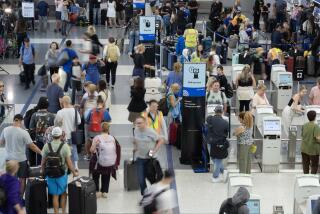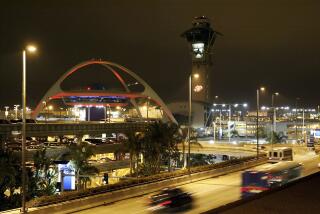As Problems Stack Up at New Airport, Hong Kong Orders Probe
- Share via
HONG KONG — Troubles for passengers at the new $20-billion Chek Lap Kok airport here are easing, but chaos at the cargo terminals continues.
On Friday, Hong Kong’s largest freight company extended until July 18 an embargo on shipments, while the government created a special team to investigate why the much-heralded airport has gone so wrong and who is responsible.
The government estimates losses of $1 billion before problems are resolved.
“This is not a time for finger pointing,” said Hong Kong Chief Executive Tung Chee-hwa, who ordered the investigation Friday. “It is a time to analyze the situation and help each other.”
The airport debuted July 6 amid much boasting: It is the world’s most expensive, has the world’s largest passenger terminal and was supposed to handle the largest amount of cargo. But computer glitches and confusion caused in part by a rushed opening paralyzed the facility by the end of the first day, and the fanfare fast dissolved into frenzy.
“This was meant to be a first-class project, but it has turned into a ninth-class airport and a disgrace,” complained legislator Lau Kong-wah at a special briefing for lawmakers Thursday. “Our airport has become the laughingstock of the world.”
In the first five days of operations, passengers have been stranded on planes, luggage took hours to arrive, and at least 12,000 bags were left behind because handlers could not load them quickly enough. By Friday, things had improved for travelers: broken toilets and telephones had been fixed, 70% of planes departed within 30 minutes of scheduled times, and most bags arrived about 35 minutes after landing, the Airport Authority said.
But in the freight terminal, problems have gotten worse.
Hong Kong Air Cargo Terminals, the territory’s largest cargo handler, announced a moratorium on all incoming and outgoing shipments except for perishables, newspapers, bullion and medical materials until midnight July 18.
The company moved its processing operations back to Kai Tak, the old airport, until its computer is fixed; this has forced shippers to shuttle goods back and forth.
“You can imagine the logistics of this are quite tremendous,” said Anthony Charter, the company’s managing director. “But I’m afraid there’s simply no way that the standard of service that we’ve all grown accustomed to at Kai Tak can be maintained for the foreseeable future.”
Businesses large and small are feeling the pinch.
Hong Kong produces few essentials on its own and relies heavily on imports. Shoppers are beginning to stock up on staples, anticipating shortages and price hikes.
Glenn Kerrigan, a restaurateur inspecting a shipment of spoiled salmon at the cargo terminal, noted that almost everything his eateries use is imported. His company has been forced to resort to desperate measures.
On Thursday, he dispatched an employee to Thailand to buy banana blossoms, sweet basil and other delicate herbs unavailable in Hong Kong. These now must be hand-carried back in bags and baskets.
But he could not do the same for the chilled Australian beef he had ordered.
“Business is tough enough as it is with the economic problems,” Kerrigan said. “This makes it even tougher for us.”
Hong Kong is in its worst recession since World War II, and officials hoped that the new airport would bolster its role as a business hub and attract much-needed tourists. Now it appears that the opposite is happening as tourists and shippers alike avoid delays and bottlenecks here.
Airports in Singapore and Macau are reporting a bump in business, especially since Malaysia’s new airport has experienced many of the same problems since it opened July 1.
More to Read
Sign up for Essential California
The most important California stories and recommendations in your inbox every morning.
You may occasionally receive promotional content from the Los Angeles Times.













